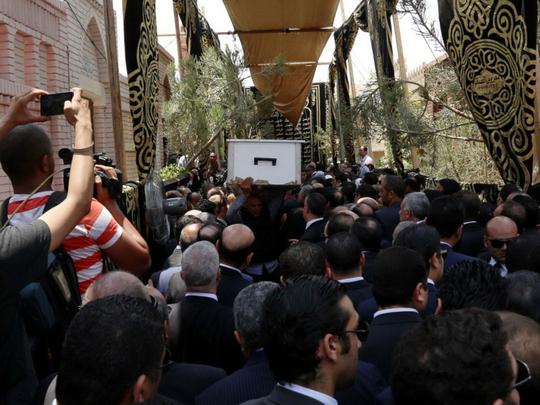
Cairo: A visibly angry Egyptian President Abdul Fattah Al Sissi pledged tougher laws against militants at the funeral on Tuesday of top prosecutor Hesham Barakat, assassinated in a Cairo car bombing.
“The arm of justice is chained by the law. We’re not going to wait for this. We’re going to amend the law to allow us to implement justice as soon as possible,” Al Sissi said in a televised speech surrounded by Barakat’s mourning relatives.
Barakat died of his wounds in hospital hours after a powerful car bomb tore through his convoy in an upscale Cairo district on Monday morning.
He was the most senior official assassinated since militants launched an insurgency following the 2013 overthrow of Islamist president Mohammad Mursi led by Al Sissi, who was then defence minister.
“Do courts in these circumstances work? Do these laws work? They work with normal people,” said Al Sissi, shaking a clenched fist for emphasis.
Barakat’s assassination has come as a blow to the president, who won elections last year pledging to wipe out militants.
Hundreds of policemen and soldiers have been killed in the insurgency based in the sparsely populated Sinai Peninsula. Daesh’s affiliate there has claimed responsibility for the deadliest attacks.
At least 1,400 people, most of them Mursi supporters, have been killed in a police crackdown on protests.
Meanwhile thousands of people, mostly Islamists but also including secular dissidents, have been jailed and hundreds sentenced to death.
Many of those sentenced to death are appealing the verdicts, a lengthy and convoluted process, but Al Sissi suggested it would be fast-tracked.
“If there is a death sentence, a death sentence will be implemented,” Al Sissi said. “The law! The law!”
Egypt deployed heavy security forces across Cairo on Tuesday amid preparations for the burial of the prosecutor general.
Barakat’s body was moved from the hospital to a mosque in the eastern suburb of Heliopolis for a funeral after noon prayers.
Armoured personnel carriers were positioned across the city, and additional checkpoints were set up. At the hospital in Heliopolis, mourners came to express condolences to Barakat’s widow.
Authorities on Monday declared June 30 — the second anniversary of mass street protests that led to Mursi’s overthrow by the military — a national holiday, but also cancelled all official celebrations in a sign of mourning for Barakat.
Television replayed footage of the blast and its aftermath, as well as funeral preparations at the Tantawi Mosque — a newly built house of worship dedicated to the retired field marshal who ran Egypt under a military council in the year between the overthrow of longtime autocrat Hosni Mubarak in 2011 and Mursi’s election. Newspapers ran front page photos of Barakat’s motorcade in flames.
Violence continued even as Egypt prepared for Barakat’s funeral. In the northern Sinai city of Shaikh Zuweyid, a mortar shell allegedly fired by extremists at an army position fell on a private residence, killing two children and wounding three others, family members said. And in the city of Beni Suef along the Nile River south of Cairo, security officials said gunmen opened fire on a police car, killing a sergeant and wounding four others.
The family members spoke on condition of anonymity for fear of repercussions, while the security officials did the same because they were not authorised to brief journalists.












